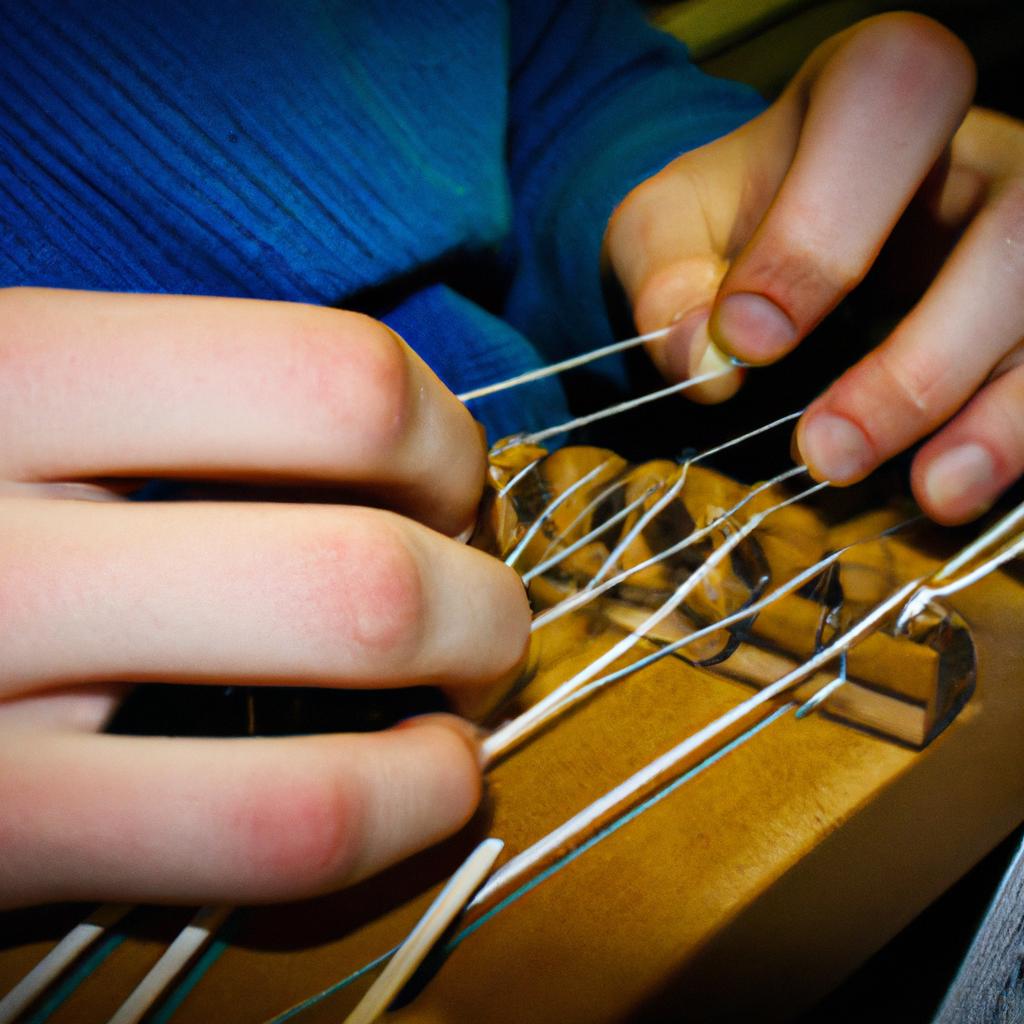In recent years, there has been an increasing interest in pursuing a bachelor’s degree in musician education. This specialized program equips aspiring musicians with the necessary skills and knowledge to not only excel in their own musical pursuits but also teach others. For instance, consider the case of Sarah, a passionate violinist who dreams of becoming a music teacher. Through her journey as a student in the musician education program, she gained invaluable insights into pedagogy, music theory, performance techniques, and various teaching methodologies.
The bachelor’s degree in musician education offers students a comprehensive curriculum that encompasses both theoretical and practical aspects of music instruction. Students delve into areas such as music history, composition, ear training, conducting, and ensemble playing. Additionally, they gain hands-on experience through internships or practicum placements where they observe experienced music educators in action or even have opportunities to lead small groups themselves. The ultimate goal is to produce well-rounded musicians who can inspire and educate future generations of musicians while nurturing their own artistic growth. In this article, we will explore everything you need to know about pursuing a bachelor’s degree in musician education – from admission requirements and coursework to career prospects and further educational options.
Program Overview
Imagine a passionate musician named Sarah who dreams of becoming an educator, sharing her love for music with others. She envisions herself teaching in schools and inspiring young minds to explore the world of melodies and harmonies. To turn this dream into reality, Sarah decides to pursue a Bachelor’s Degree in Musician Education.
The program provides students like Sarah with comprehensive knowledge and skills necessary to excel as both musicians and educators. Through a balanced curriculum that combines theoretical studies with practical experiences, graduates are well-prepared to embark on their teaching careers.
Here is what you can expect from the Bachelor’s Degree in Musician Education:
- Enhanced Musical Abilities: Students have the opportunity to refine their musical abilities through specialized courses such as music theory, ear training, composition, and performance techniques.
- Pedagogical Training: The program equips future educators with effective teaching methodologies tailored specifically for music education. This includes learning about classroom management strategies, adapting lessons for diverse learners, and incorporating technology into instruction.
- Field Experience: Students gain hands-on experience by participating in internships or practicum placements at local schools or community organizations. These opportunities allow them to apply their knowledge in real-world settings under the guidance of experienced mentors.
- Professional Development: Graduates leave the program equipped with essential professional skills needed to thrive in the field of music education. They learn how to develop curriculum plans, assess student progress effectively, collaborate with colleagues, and engage parents/guardians in the learning process.
| Benefits | Description |
|---|---|
| 1. Broadened Horizons | Gain exposure to various genres, styles, and cultures within the realm of music |
| 2. Impactful Teaching Techniques | Learn innovative approaches that promote active engagement and foster a lifelong appreciation for music |
| 3. Networking Opportunities | Connect with professionals in the industry through workshops, conferences, and guest lectures |
| 4. Personal Fulfillment | Experience the joy of inspiring and nurturing young musicians, making a lasting impact on their lives |
With its comprehensive curriculum, practical experiences, and emphasis on both musical expertise and pedagogical skills, the Bachelor’s Degree in Musician Education offers aspiring educators like Sarah an opportunity to transform their passion for music into a meaningful career.
Moving forward, let’s explore the admission requirements for this program and how you can take your first step towards realizing your dream of becoming a music educator.
Admission Requirements
Transitioning from the Program Overview, let us now delve into the admission requirements for a Bachelor’s Degree in Music Education. To better understand these requirements, we can examine a hypothetical example of an aspiring musician named Sarah who wishes to pursue this degree.
Sarah has always been passionate about music and desires to share her knowledge and skills with others as a music educator. She has completed her high school education and is now looking to embark on her journey towards obtaining a Bachelor’s Degree in Music Education. Let us explore the specific admission requirements that she would need to meet:
-
Academic Qualifications:
- A high school diploma or equivalent is typically required for admission.
- A competitive grade point average (GPA) may be expected, usually ranging from 2.5-3.0 or higher.
- Transcripts showcasing coursework in subjects such as music theory, performance, and general education are often considered during the application process.
-
Audition or Portfolio Submission:
- Many institutions require applicants to showcase their musical abilities through auditions or portfolio submissions.
- For instrumentalists, this may involve performing pieces from various genres and demonstrating technical proficiency.
- Vocalists might be asked to perform selections highlighting their range, control, and interpretation.
- In some cases, applicants could also provide recordings or videos showcasing their performances if they cannot attend an in-person audition.
-
Letters of Recommendation:
- Institutions may request letters of recommendation from individuals familiar with the applicant’s musical abilities and potential for success in music education.
- These letters should ideally come from teachers or mentors who can speak to the applicant’s dedication, work ethic, talent, and passion for music.
-
Personal Statement:
- Applicants are often required to submit a personal statement expressing their motivations for pursuing a career in music education.
- This gives them an opportunity to articulate their goals, experiences, and commitment to the field.
- It is important for applicants to showcase their understanding of the role of a music educator and how they intend to contribute positively to the profession.
By meeting these admission requirements, Sarah can increase her chances of being accepted into a Bachelor’s Degree program in Music Education. In the subsequent section about “Curriculum,” we will explore the courses and subjects that she might encounter on this educational journey.
Curriculum
To pursue a Bachelor’s Degree in Musician Education, there are specific admission requirements that applicants must meet. These requirements ensure that students possess the necessary skills and knowledge to excel in this program. Let’s explore some of the key criteria for admission.
Firstly, prospective students should have a strong background in music theory and performance. For example, imagine Sarah—a talented violinist with years of experience playing in orchestras and participating in musical competitions. Her proficiency in her instrument showcases her dedication and passion for music, which would make her an ideal candidate for the program.
Additionally, individuals applying to this degree program must typically submit a portfolio or audition as part of their application process. This allows admissions committees to assess candidates’ musical abilities firsthand. It is important for applicants to demonstrate technical proficiency, musicianship, and creativity during these auditions or portfolio reviews.
When considering applications, academic achievements also play a role. While each institution may have different requirements regarding minimum grade point averages (GPAs), it is generally expected that applicants have performed well academically throughout high school or previous college coursework.
In summary, meeting the admission requirements for a Bachelor’s Degree in Musician Education entails having a solid foundation in music theory and performance, showcasing musical talents through auditions or portfolios, and maintaining good academic standing.
Now let’s move on to exploring the curriculum offered by such programs.
Curriculum
As aspiring musicians pursue their Bachelor’s Degree in Musician Education, they engage in a comprehensive curriculum that equips them with the necessary skills and knowledge for a successful career. The program offers a wide range of courses designed to develop musical proficiency, pedagogical expertise, and an understanding of music theory and history. This section will explore the key components of the curriculum.
Curriculum Components:
-
Instrumental/Vocal Training:
- Students receive specialized training on their primary instrument/voice through private lessons and ensemble participation.
- Case Study: Consider John, a saxophonist pursuing his degree. He takes weekly saxophone lessons where he hones his technical abilities and learns repertoire suitable for teaching different skill levels.
-
Pedagogy and Teaching Methodologies:
- Courses focus on instructional strategies tailored to various age groups and learning styles.
- Instructors emphasize effective lesson planning, assessment techniques, classroom management, and fostering creativity.
- Bullet Point List:
- Cultivating passion for music through engaging teaching methods
- Developing strong communication skills to effectively convey complex concepts
- Encouraging self-expression and confidence in students’ musical abilities
- Nurturing critical thinking by incorporating problem-solving activities into lessons
-
Music Theory and History:
- Students delve into the theoretical aspects of music such as harmony, counterpoint, analysis, composition techniques etc.
- They also study the historical development of different genres and gain insights into influential composers throughout time.
-
Practical Experience:
- To enhance real-world application of their education, students participate in internships or practicum experiences at educational institutions or community organizations.
Overall, this well-rounded curriculum provides aspiring musician educators with both theoretical knowledge and practical skills necessary for their future profession. By integrating instrumental/vocal training, pedagogy and teaching methodologies, music theory and history, as well as hands-on experience, students gain a comprehensive understanding of the field.
Transition into subsequent section:
As graduates progress through their studies in Musician Education, they not only acquire valuable knowledge but also develop important skills that are essential to excel in their chosen careers. The next section will explore the Skills Development aspect of this degree program.
Skills Development
Career Opportunities
Having explored the educational path towards obtaining a Bachelor’s Degree in Musician Education, let us now delve into the vast array of career opportunities that await graduates in this field. To illustrate the potential paths one can take, consider the case study of Emma, a recent graduate who specialized in instrumental education.
Paragraph 1: Upon completing her degree, Emma found herself presented with various career choices. She decided to pursue teaching at an elementary school where she could impart her knowledge and passion for music to young minds. Her role involved designing engaging lesson plans, conducting ensemble rehearsals, and providing individualized instruction tailored to each student’s needs. Emma discovered immense satisfaction in witnessing her students’ musical growth and development throughout the academic year.
- The following bullet points showcase some possible career options for individuals holding a Bachelor’s Degree in Musician Education:
- Private music instructor or tutor
- Community center program coordinator
- Music curriculum developer
- Arts administrator
Paragraph 2: In addition to traditional teaching roles, musicians with a bachelor’s degree have numerous other exciting prospects available to them. Many choose to explore performance opportunities by joining professional orchestras, bands, or ensembles as instrument specialists or section leaders. Others opt for careers as composers or arrangers, contributing their unique artistic perspectives to film scores, commercials, and theater productions.
| Career Path | Description | Skills Required |
|---|---|---|
| Private Instructor | Provides personalized lessons on specific instruments | Strong interpersonal skills |
| Program Coordinator | Oversees community-based music programs | Organizational and leadership abilities |
| Curriculum Developer | Designs innovative curricula for schools | Creativity and instructional design skills |
| Arts Administrator | Manages operations within arts organizations | Budgeting and project management expertise |
Paragraph 3: With such diverse possibilities awaiting graduates of a Bachelor’s Degree in Musician Education, it is clear that this field offers not only stability but also room for personal and professional growth. Whether one chooses to inspire young learners through teaching or pursue a career in performance or composition, the skills acquired during their degree program will prove invaluable throughout their journey.
Moving forward, let us now explore the significance of joining professional associations within the music education industry as we continue our exploration into this dynamic field.
Professional Associations
Transitioning from the development of essential skills, it is crucial for aspiring musicians pursuing a bachelor’s degree in Musician Education to further enhance their abilities and acquire specialized competencies. This section delves into the various areas where students can focus on honing their craft and expanding their knowledge base.
One example that exemplifies the significance of skill development is the case of Emily, an undergraduate student majoring in Musician Education. Through her studies, she had the opportunity to develop proficiency in music theory and composition. By immersing herself in these disciplines, Emily was able to analyze musical structures effectively, which ultimately improved her ability to teach others about harmony and melodic continuity.
To excel as educators and performers, students pursuing a bachelor’s degree in Musician Education are encouraged to concentrate on developing several key skills:
- Pedagogical Techniques: Acquiring effective teaching methods allows musicians to communicate complex concepts clearly while adapting instruction styles to different learning needs.
- Performance Skills: Developing technical mastery and expressive interpretation enhances musicians’ ability to engage with audiences and serve as role models for their future students.
- Collaboration Skills: Building strong interpersonal skills enables musicians to work harmoniously within ensembles or orchestras, fostering collaboration and collective success.
- Technology Integration: Embracing advancements in music technology equips individuals with innovative tools for music creation, production, recording, and online education delivery.
The table below provides a comprehensive overview of how these skills contribute to a well-rounded musician educator:
| Skill | Description |
|---|---|
| Pedagogical Techniques | Effective instructional strategies tailored towards diverse learners |
| Performance Skills | Technical proficiency combined with captivating stage presence |
| Collaboration Skills | The ability to work collaboratively within ensembles or orchestras |
| Technology Integration | Proficiency in utilizing modern music technology for composition, production, and online instruction |
By prioritizing the development of these skills, students in a bachelor’s degree program in Musician Education can cultivate their expertise as both musicians and educators. Emulating Emily’s case study demonstrates how an emphasis on skill enhancement can lead to well-rounded professionals who possess the necessary tools to inspire future generations through music education.
In summary, through dedicated focus on pedagogical techniques, performance skills, collaboration abilities, and technology integration, aspiring musician educators will be equipped with a versatile skill set essential for success in their careers. This multifaceted approach ensures that they are not only accomplished performers but also effective instructors capable of nurturing musical talent among their students.
 Mikey Dee
Mikey Dee



